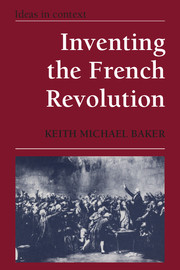Book contents
- Frontmatter
- Contents
- Acknowledgments
- Introduction
- 1 On the problem of the ideological origins of the French Revolution
- Part I French history at issue
- 2 Memory and practice: politics and the representation of the past in eighteenth-century France
- 3 Controlling French history: the ideological arsenal of Jacob-Nicolas Moreau
- 4 A script for a French revolution: the political consciousness of the abbé Mably
- Part II The language of politics at the end of the Old Regime
- Part III Toward a revolutionary lexicon
- Notes
- Index
3 - Controlling French history: the ideological arsenal of Jacob-Nicolas Moreau
Published online by Cambridge University Press: 05 June 2012
- Frontmatter
- Contents
- Acknowledgments
- Introduction
- 1 On the problem of the ideological origins of the French Revolution
- Part I French history at issue
- 2 Memory and practice: politics and the representation of the past in eighteenth-century France
- 3 Controlling French history: the ideological arsenal of Jacob-Nicolas Moreau
- 4 A script for a French revolution: the political consciousness of the abbé Mably
- Part II The language of politics at the end of the Old Regime
- Part III Toward a revolutionary lexicon
- Notes
- Index
Summary
In 1760, at the end of a decade of bitter constitutional struggle in France, a confidential memorandum circulated in ministerial circles at Versailles under the title “Principes de conduite avec les parlements.” A powerful blueprint for ideological action in defense of the absolute monarchy, it was drafted by a young lawyer and government propagandist, Jacob- Nicolas Moreau. He was to pursue the campaign outlined in this document for the next thirty years, for the greater part of which period he enjoyed the official title of historiographer-royal. An analysis of his activities and arguments in this regard reveals some interesting dimensions of the process of ideological elaboration that occurred in France during the last decades of the Old Regime.
Moreau was born in 1717 at Saint-Florentin in Burgundy, the son of a “hardened Jansenist” obliged by his religious convictions to abandon a prospective ecclesiastical career for the traditional family practice of the law. Brought up a “good little Jansenist,” as he confessed in his Souvenirs, he was sent to Paris in 1734 to be educated at the College de Beauvais, then one of the principal centers of Jansenism. His father's contacts brought him a ready entry into Jansenist and legal circles in the capital, where he was taken under the wing of the devout magistrate Jérôme-Nicolas de Pâris (brother of the miracle-working deacon of Saint-Médard) and enjoyed the patronage of the family of Chancellor d'Aguesseau (whose grandchildren he briefly tutored).
- Type
- Chapter
- Information
- Inventing the French RevolutionEssays on French Political Culture in the Eighteenth Century, pp. 59 - 85Publisher: Cambridge University PressPrint publication year: 1990
- 2
- Cited by

